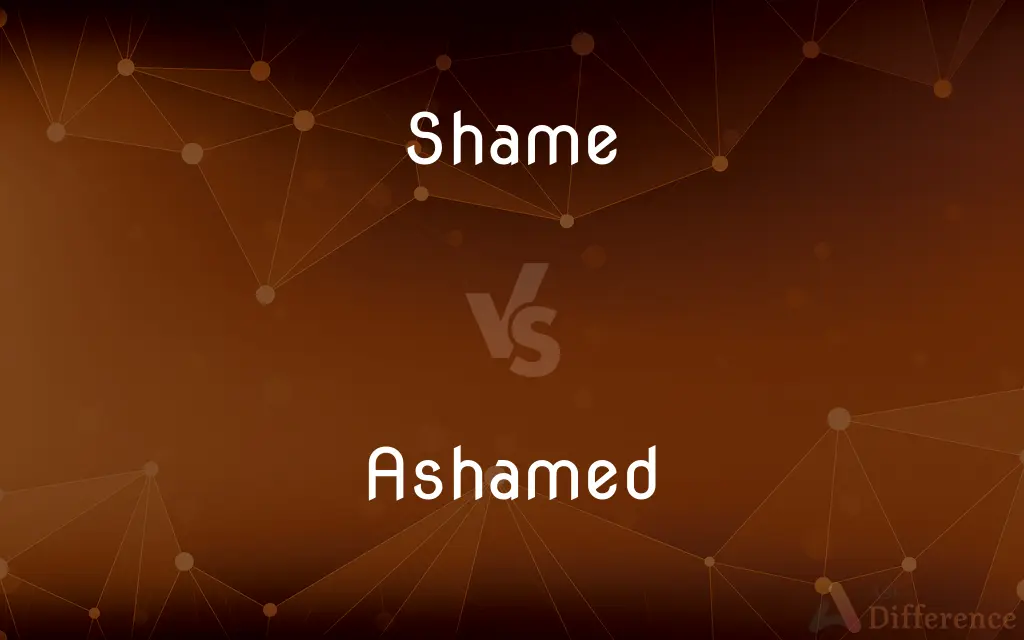Shame vs. Ashamed — What's the Difference?
By Tayyaba Rehman — Published on October 16, 2023
Shame is a painful feeling due to wrong or foolish behavior; ashamed is feeling embarrassed or guilty about one’s actions, characteristics, or associations.

Difference Between Shame and Ashamed
Table of Contents
ADVERTISEMENT
Key Differences
The conceptual distinction between shame and ashamed primarily lies in their usage and implication within the realm of emotions. Shame is a noun, representing a profound emotion experienced by individuals when they perceive their actions or behaviors as morally or socially unacceptable, engendering a sense of humiliation or distress. It often involves a perception of oneself as flawed or inferior, possibly invoking a desire to hide or disappear.
Ashamed, in contrast, is an adjective, describing the emotional state or condition of feeling remorse, embarrassment, or guilt due to one’s actions, characteristics, or associations. When someone is ashamed, they experience a sense of regret or dishonor about something they have done, or a quality or trait they possess. It implies a self-conscious emotion, reflecting an internal acknowledgment of a violation of social or moral norms.
Shame operates as a multifaceted emotional response, reflecting internal turmoil over perceived failures, inadequacies, or moral lapses, and it can be a powerful motivator for behavioral change or, conversely, a source of debilitating stress and low self-worth. It can be self-imposed or can be imposed by societal norms and values.
Ashamed embodies the internal and subjective aspect of this emotion, signifying the personal realization and acknowledgment of one’s failures or wrongdoings. It can be context-specific, contingent upon one’s values, moral compass, and the social or cultural norms one adheres to, making it highly variable and subjective.
In summation, while shame encapsulates the complex emotional response to one’s perceived shortcomings or moral failures, being ashamed denotes the personal acknowledgment and internalization of such an emotion, making it a more personalized, subjective experience of remorse or embarrassment.
ADVERTISEMENT
Comparison Chart
Part of Speech
Noun
Adjective
Represents
A profound, painful emotion due to wrong or foolish behavior
The state of feeling embarrassed or guilty
Implication
Implies a perception of oneself as flawed or inferior
Implies a realization and acknowledgment of guilt or dishonor
Nature
Can be both self-imposed and societal
Internal and subjective
Function
Can serve as a motivator for change or a source of stress
Reflects personal realization of moral or social norm violation
Compare with Definitions
Shame
A sense of humiliation or distress caused by the consciousness of wrong or foolish behavior.
Her shame was evident when she avoided eye contact.
Ashamed
Feeling embarrassed or guilty because of one’s actions, characteristics, or associations.
She was ashamed of her rude behavior at the party.
Shame
A regrettable or unfortunate situation or action.
It is a shame that the event was canceled due to the weather.
Ashamed
Feeling regret or condemnation; feeling sorry.
She was deeply ashamed of her harsh words.
Shame
Shame is an unpleasant self-conscious emotion typically associated with a negative evaluation of the self; withdrawal motivations; and feelings of distress, exposure, mistrust, powerlessness, and worthlessness.
Ashamed
Reluctant to do something through fear of embarrassment or humiliation.
I am not ashamed to admit that I made a mistake.
Shame
A painful emotion caused by the belief that one is, or is perceived by others to be, inferior or unworthy of affection or respect because of one's actions, thoughts, circumstances, or experiences
Felt shame for having dropped out of school.
Ashamed
Experiencing a sense of guilt or dishonor about something.
He felt ashamed for betraying his friend’s trust.
Shame
Respect for propriety or morality
Have you no shame?.
Ashamed
Experiencing disgrace or shame.
He was ashamed of his cowardice.
Shame
A condition of disgrace or dishonor; ignominy
An act that brought shame on the whole family.
Ashamed
Feeling shame or guilt
Are you ashamed for having lied?.
Shame
A regrettable or unfortunate situation
"It was a shame how the place had fallen apart, with tall scorched grass and sagging gutters" (Tom Drury).
Ashamed
Feeling inferior, inadequate, or embarrassed
Ashamed of my torn coat.
Shame
One that brings dishonor, disgrace, or condemnation
"I would ... Forget the shames that you have stained me with" (Shakespeare).
Ashamed
Reluctant through fear of humiliation or shame
Ashamed to ask for help.
Shame
To cause to feel shame
"expletives that would have shamed a stevedore" (Jeffrey Tayler).
Ashamed
Feeling shame or guilt.
Shame
To cause to feel ashamed to the point of doing something
I was shamed into making an apology.
Ashamed
Simple past tense and past participle of ashame
Shame
To bring dishonor or disgrace on
Behavior that shamed him in the eyes of the community.
Ashamed
Affected by shame; abashed or confused by guilt, or a conviction or consciousness of some wrong action or impropriety.
All that forsake thee shall be ashamed.
I began to be ashamed of sitting idle.
Enough to make us ashamed of our species.
An ashamed person can hardly endure to meet the gaze of those present.
Shame
To disgrace by surpassing
Wanted revenge because a rival had shamed him in the previous race.
Ashamed
Used of persons; feeling shame or guilt or embarrassment or remorse;
Are you ashamed for having lied?
Felt ashamed of my torn coat
Shame
Uncomfortable or painful feeling due to recognition or consciousness of one's own impropriety or dishonor, or something being exposed that should have been kept private.
When I realized that I had hurt my friend, I felt deep shame.
The teenager couldn’t bear the shame of introducing his parents.
Shame
Something to regret.
It was a shame not to see the show after driving all that way.
Shame
Reproach incurred or suffered; dishonour; ignominy; derision.
Shame
The cause or reason of shame; that which brings reproach and ignominy.
Shame
That which is shameful and private, especially private parts.
Shame
The capacity to be ashamed, inhibiting one from brazen behaviour; due regard for one's own moral conduct and how one is perceived by others; restraint, moderation, decency.
Don't you have any shame?
Shame
A cry of admonition for the subject of a speech, either to denounce the speaker or to agree with the speaker's denunciation of some person or matter; often used reduplicated, especially in political debates.
Shame
(South Africa) Expressing sympathy.
Shame, you poor thing, you must be cold!
Shame
(transitive) To cause to feel shame.
I was shamed by the teacher's public disapproval.
Shame
(transitive) To cover with reproach or ignominy; to denounce as having done something shameful; to dishonor; to disgrace.
Shame
(transitive) To drive or compel by shame.
The politician was shamed into resigning.
Shame
To feel shame, be ashamed.
Shame
To mock at; to deride.
Shame
A painful sensation excited by a consciousness of guilt or impropriety, or of having done something which injures reputation, or of the exposure of that which nature or modesty prompts us to conceal.
HIde, for shame,Romans, your grandsires' images,That blush at their degenerate progeny.
Have you no modesty, no maiden shame?
Shame
Reproach incurred or suffered; dishonor; ignominy; derision; contempt.
Ye have borne the shame of the heathen.
Honor and shame from no condition rise.
And every woe a tear can claimExcept an erring sister's shame.
Shame
The cause or reason of shame; that which brings reproach, and degrades a person in the estimation of others; disgrace.
O C sar, what a wounding shame is this!
Guides who are the shame of religion.
Shame
The parts which modesty requires to be covered; the private parts.
Shame
To make ashamed; to excite in (a person) a comsciousness of guilt or impropriety, or of conduct derogatory to reputation; to put to shame.
Were there but one righteous in the world, he would . . . shame the world, and not the world him.
Shame
To cover with reproach or ignominy; to dishonor; to disgrace.
And with foul cowardice his carcass shame.
Shame
To mock at; to deride.
Ye have shamed the counsel of the poor.
Shame
To be ashamed; to feel shame.
I do shameTo think of what a noble strain you are.
Shame
A painful emotion resulting from an awareness of inadequacy or guilt
Shame
A state of dishonor;
One mistake brought shame to all his family
Suffered the ignominy of being sent to prison
Shame
An unfortunate development;
It's a pity he couldn't do it
Shame
Bring shame or dishonor upon;
He dishonored his family by committing a serious crime
Shame
Compel through a sense of shame;
She shamed him into making amends
Shame
Cause to be ashamed
Shame
Surpass or beat by a wide margin
Shame
A painful feeling due to wrong or foolish behavior.
The shame he felt after lying was overwhelming.
Shame
A state of being disgraced or dishonored.
The athlete brought shame to his team by cheating.
Shame
A feeling of being unworthy or dishonorable.
He lived with the shame of his past mistakes.
Common Curiosities
Does being ashamed reflect personal realization of guilt or dishonor?
Yes, being ashamed reflects a personal realization and acknowledgment of guilt or dishonor.
Can shame serve as a motivator for change?
Yes, shame can serve as a powerful motivator for behavioral change.
Is shame a noun or an adjective?
Shame is a noun.
Does feeling ashamed imply acknowledgment of one’s wrongdoings?
Yes, feeling ashamed implies a realization and acknowledgment of one’s wrongdoings.
Can shame be both self-imposed and societal?
Yes, shame can be both self-imposed and imposed by societal norms and values.
Is ashamed a noun or an adjective?
Ashamed is an adjective.
Can shame be associated with a sense of humiliation or distress?
Yes, shame often involves a sense of humiliation or distress due to one’s perceived wrong or foolish behavior.
Share Your Discovery

Previous Comparison
Blackberries vs. Blueberries
Next Comparison
Supermarket vs. Convenience StoreAuthor Spotlight
Written by
Tayyaba RehmanTayyaba Rehman is a distinguished writer, currently serving as a primary contributor to askdifference.com. As a researcher in semantics and etymology, Tayyaba's passion for the complexity of languages and their distinctions has found a perfect home on the platform. Tayyaba delves into the intricacies of language, distinguishing between commonly confused words and phrases, thereby providing clarity for readers worldwide.














































